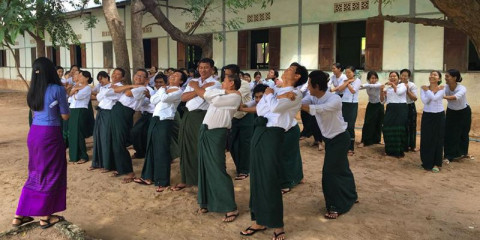
GCED Basic Search Form
Quick Search
You are here
News

In early June, Myanmar unveiled two policies on environmental management and climate change strategy meant to contribute to a more sustainable future. In addition to fast-paced economic change and development, Myanmar is also feeling the negative effects of a changing climate. Although it is nowhere near a top emitter of greenhouse gases, Myanmar is one of the nations worst affected by extreme weather events and climate change. In fact, it has been one of the most natural disaster-prone countries in the world over the last two decades.
Building a sustainable future, however, will require more than just progress on the environmental dimension of sustainable development. Conflicts, such as those in Rakhine, Shan and Kachin states, hamper efforts at sustainable prosperity. Myanmar, rich in diversity, also needs to promote respect for diversity, tolerance and non-discrimination. Sustainable development in Myanmar will rely on a peaceful society, but at the same time, the country cannot maintain peace without a sustainable path for growth and development. Education will be the key driver in realizing these mutually dependent goals.
Improving education for peace and sustainable development (EPSD) will have lasting impacts on not only the learning outcomes and the quality of education but will contribute to fostering a more inclusive, equal and just society. EPSD encourages a positive school culture and high levels of student engagement, as well as cultivating practices consistent with the values of equality and respect, while developing skills and attitudes that enable citizens to lead healthy and fulfilling lives. Collaboration, problem-solving, information and communications technology (ICT) literacy, as well as social and cultural competencies – all of these are 21st-century values and skills that Myanmar has committed to instilling in youth.
In support of the Ministry of Education’s agenda, UNESCO and the Department of Educational Research, Planning and Training recently hosted a Policy Dialogue on Education for Peace and Sustainable Development under Sustainable Development Goal 4.7 and their Contributions to Quality Education. More than 100 participants attended, including high-level officials from the Ministry of Education, parliamentarians, teacher educators, civil society and development partners. As one event in a larger seminar series, education stakeholders had the opportunity to think through improving the quality of education through EPSD and plan methods for implementation.
Dr Myo Thein Gyi, the Union Minister of Education, and UNESCO Regional Director Shigeru Aoyagi kicked off the seminar with opening remarks focused on the path forward and regional cooperation. The Minister highlighted links between SGD 4.7 and achieving other Sustainable Development Goals, illustrating the target’s importance for Myanmar’s education reform agenda and National Development Plan.
Delivering the keynote address, Dr Felisa Tibbitts, a lecturer at Teachers College at Columbia University, asked participants to consider their personal connections with the concept of peace, describing the advantages and disadvantages of various models of education for peace and sustainable development. A panel comprising representatives from the Department of Basic Education, an Education College and Kalyana Mitta Development Foundation reviewed current government and civil society initiatives that incorporate EPSD at different levels of Myanmar’s education system.
The Government and UNESCO are also working together on other initiatives tied to EPSD, including curriculum reforms in progress at Education Colleges. The reform is part of a broader transformation to upgrade the colleges’ current two-year course into a four-year degree programme. With support from UNESCO, members of the Teacher Education Curriculum Core Team – a group of teacher educators developing the revised curriculum – are integrating the concepts of peace and sustainable development into the new educational programme. These core members also attended the seminar to incorporate lessons into future reforms.
“I am really glad for the opportunity to participate in this seminar,” said Daw Sandar Myint, a member of the Primary Curriculum Development Team. “As I am from the music department, I plan to teach poems and songs with themes of peace to the children, in order to incorporate EPSD into my syllabus. Through the seminar, I was also able to consider how to practice peaceful living for myself.”
Raising awareness and sparking conversation among policy-makers and education stakeholders on topics such as developing teacher policy, strengthening the technical and vocational education and training system, and managing the impact of private tutoring is fundamental to lasting change in a 21st-century education system.
This fourth and final policy dialogue is a stepping stone for implementing SDG 4.7, in particular education for peace and sustainable development. Activities like the Policy Dialogue series, focused on strengthening education policy and planning, are a critical component of UNESCO Myanmar’s overarching strategy in assisting Myanmar to achieve accessible quality education that is inclusive, equitable and prepares learners for 21st Century challenges.
URL:
